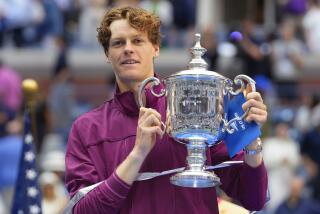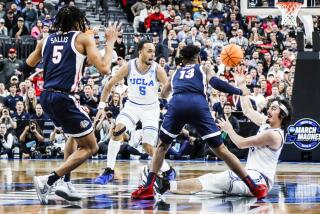It’s Aristotle Agassi, an Older, Wiser Loser : U.S. Open: A finalist last year, now a flop in ‘91, Andre the Client has only his post-match remarks to market this time.
NEW YORK — On a warm, humid Monday at the U.S. Open, Andre Agassi may have turned a corner in his short, colorful career.
Andre the Client, a marketing creation, a walking, talking, forehand-smashing tennis-playing billboard, lost his first-round match in straight sets and immediately took on a new persona.
Andre the Philosopher?
“I don’t know what is harder, to lose in the first round or lose in the finals,” said Agassi, who now has experience in both.
A year ago, he lost to Pete Sampras in the U.S. Open final. This year, on opening day at the Open, he lost to Aaron Krickstein, 7-5, 7-6 (7-3), 6-2.
“You know, you have your hopes, but I mean, worse things could have happened,” Agassi said. “Nobody died out there.”
He was right, of course. Still, Krickstein delivered a fatal blow to Agassi’s last chance for a Grand Slam victory in 1991, which at one time looked like a moment in history waiting to happen.
For Agassi, seeded eighth, it was his worst Grand Slam defeat since he lost to Henri Leconte in the first round of the 1987 U.S. Open.
Since June, Agassi lost to Jim Courier in the French Open final and to David Wheaton in the quarterfinals of Wimbledon in his two other Grand Slam events this year.
“You know, hopefully, given a few days, I don’t look at this as too much of a setback,” Agassi said. “I think the idea is too keep looking forward. But you know, it is not going to be easy--it feels like the tournament hasn’t started yet.”
For John McEnroe, it started too soon. His match against Glenn Layendecker was scheduled to follow Agassi’s, and McEnroe said he miscalculated how long Agassi and Krickstein would be out on the court, went and got something to eat, and was suddenly confronted with having to go out and play before he was ready.
“I looked in, thought he (Agassi) was playing better and thought he was coming back,” said McEnroe, who managed to beat Layendecker, 6-4, 6-3, 6-3, after struggling at the beginning and losing the first three games.
The tournament also started quickly for Michael Chang, who strode into the second round with a 6-3, 6-0, 6-2 victory over Mark Woodforde, and for defending champion Sampras, who won his first nine games and took out Christo van Rensburg, 6-0, 6-3, 6-2.
Chang, unseeded and ranked No. 22, said he feels good about himself. “I don’t think that I am very down on myself,” he said. “The summer has been, you know, not as great as I wanted it to be.”
Sampras said, “I played well, with no aches and pains. I know I can win here.”
Agassi’s summer ended Monday. The end was not really so unexpected, considering that Agassi was sick in both Cincinnati and Indianapolis. Since winning the Sovran Bank Tennis Classic in Washington in mid-June, Agassi is 2-4.
Agassi blamed his two-tournament illness on a virus, but said he thought he had recovered.
However, Krickstein said he thought he held an advantage.
“I feel like I’m in better shape than he is,” Krickstein said. “I don’t know what kind of shape he is in or if he is sick physically or if there is something wrong with him.”
There was definitely something wrong with Agassi in the second set tiebreaker that swung the match squarely to Krickstein. Agassi trailed, 4-3, then hit a forehand approach wide, double-faulted after his racket slipped out of his hands and hit the net, then committed another unforced error on another forehand slapped wide at set point.
“He missed easy shots,” said Krickstein. “He might have been flustered. That was definitely big. If he had won, maybe he would have gotten some new life.”
Krickstein, who has not gone beyond the quarterfinals in any tournament this year, came up with a winning game plan to combat Agassi’s powerful groundstrokes. Krickstein decided to keep the ball high, move Agassi around the court and alter the pace so Agassi could not get in a groove.
It all worked. Agassi said Krickstein was more responsible for the outcome of the match than he was.
“He played unbelievable,” Agassi said. “I didn’t think, you know, that he would go out there firing those kind of shots so early. And he put me a step back really early in the match.”
So Agassi took a step back in his volcanic career, not yet five years old, but full of disappointment. Since last year’s French Open, he lost three Grand Slam finals, then lost in a quarterfinal and now in the first round. The next progression can only be to lose in qualifying.
More to Read
Go beyond the scoreboard
Get the latest on L.A.'s teams in the daily Sports Report newsletter.
You may occasionally receive promotional content from the Los Angeles Times.










